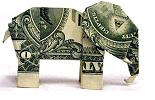 My individual stock portfolio is full of dividend-paying stocks, leading by Citigroup (6.5% yield), Bank of America (5.5% yield) and Pfizer (4.9% yield). As a matter of fact, all but two of my 13 individual stock positions at the end of November is paying regular dividends.
My individual stock portfolio is full of dividend-paying stocks, leading by Citigroup (6.5% yield), Bank of America (5.5% yield) and Pfizer (4.9% yield). As a matter of fact, all but two of my 13 individual stock positions at the end of November is paying regular dividends.
I do believe a long dividend paying history and consistency on dividend increase are good indicators of a company's long-term performance. However, I don't really think myself as a dividend investor. Why?
First, company can create shareholder value in many ways other than returning cash to investors as regular dividends. For one, great companies can always find opportunities to invest for future growth. But even when cash generated by operation exceeds tangible investment opportunities, dividend is not necessarily the best way to return cash to shareholder. Depending on the stock price, shareholders can be better off when company buys back stocks at cheap, and pays dividend when stock price at high. Therefore, companies with no dividend or low dividend payout ratio have more flexibility in maximizing shareholder returns.
Second, regular dividend payment means regular IRS assessment on investors' gains and it is detrimental to long-term investment gains. The reason that 401(k) is a good tax-saving vehicle is not because it can defer the tax you otherwise will pay on your contributions -- mathematically, it makes no difference on the end results whether you get taxed at the front-end or back-end -- but is because you don't get taxed annually on your investment gains, and therefore more of your investment gains can make money for you in the upcoming years. Investment in dividend-paying companies, if not in tax-advantaged accounts, will actually grow slower.
So all in all, I do pay attention to a company's dividend status and history, but I discount such information and focus more on business opportunities and valuation. Call me a value investor if you will!
